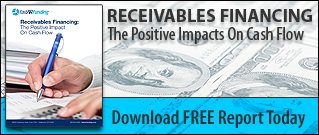
In order to efficiently run a business, you must have cash. It’s not a huge secret.
In my tenure in the commercial finance industry from serving as a lowly analyst to managing factoring deals and asset based loans, the most important thing I’ve learned is that no matter the industry your company serves, you must have cash to meet daily needs:
- Meet that all important Friday payroll.
- Keep your vendors happy.
- Buy inventory.
- Business development.
It really doesn’t work when you don’t plan out your cash flow. What I mean is plan what vendors are coming due, how much your payroll is, and any other obligations.
In addition you should always have cash reserves. At the end of the day, the strength of your balance sheet is what leads to success.
Factoring is the way to go………………….
If you own a business and you find that you’re really disorganized in how you manage cash or because of slow collections you have tight cash flow, and you really want to try improving cash flow, you may want to consider factoring receivables.
Factoring is a form of specialized commercial financing where you sell your company’s receivables relating to credit worthy customers to a third party known as a factor.
Advance rates do vary, but are typically around 80% with the remaining portion reserved until the invoice is paid.
Once the invoice is paid, you can get the remaining portion back less any applicable fees.
The Things You Should Know…..…….
Going back to the title of my article, there are so many things that a business owner needs to know about factoring. What I’d like to do is outline what I feel are the most important things you should know regarding factoring.
- Closing the Gap: Factoring really helps close the gap between when you bill your customer for products or services and when the receivable is collected.
Many companies will work really hard to stretch payments to you. Customers can pay upwards to 30, 60, and 90 days. There’s no way you can adequately pay the bills if it’s takes them that long to pay you.
I’ve found that some business owners have a difficult time really keeping their cash flow organized. Really……most of the time it comes back to one point……trying to adequately manage your receivables and staying on top of collections, which leads into my second point.
- Accounts Receivable Management: If you find yourself having a difficult time staying on top of your receivable collections, the factoring company also monitors your receivables (or the ones you factor at least).
They want to make sure invoices are paid as well. In their due diligence process they at times find out if there are issues with invoices and can notify you rather quickly.
- Not a Long Term Commitment and Won’t Cost an Arm and a Leg: A factoring line is considered short term financing. If you look into taking out a factoring line, then you’re not looking at a long term commitment to a bank.
The other thing too is while yes there is a fee……it won’t break the bank.
Depending on the factoring company you choose to go with fees can be based on how far an invoice ages out. If you choose to not factor all of your receivables then maybe look at only factoring your customers that pay the fastest. It could save you in fees while improving your cash flow.
Food for thought………depending on the factoring company you go with, everything from the application to submitting your invoices for purchasing to requesting funding is done online and is virtually paperless. Approvals can be as quick as a few days.
If you’re not a planner and don’t know what bills are due from one week to the next, or if you own a business and just a need a little help from time to time. Then consider investing in a factoring program. Hope this helps in your decision making process. Good luck!









